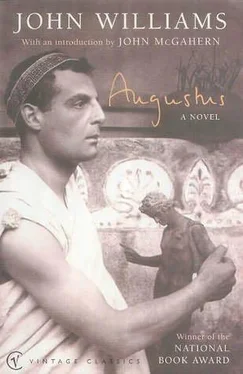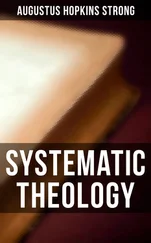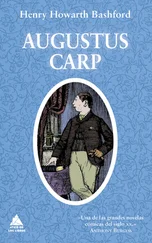John Williams - Augustus
Здесь есть возможность читать онлайн «John Williams - Augustus» весь текст электронной книги совершенно бесплатно (целиком полную версию без сокращений). В некоторых случаях можно слушать аудио, скачать через торрент в формате fb2 и присутствует краткое содержание. Жанр: Историческая проза, на английском языке. Описание произведения, (предисловие) а так же отзывы посетителей доступны на портале библиотеки ЛибКат.
- Название:Augustus
- Автор:
- Жанр:
- Год:неизвестен
- ISBN:нет данных
- Рейтинг книги:3 / 5. Голосов: 1
-
Избранное:Добавить в избранное
- Отзывы:
-
Ваша оценка:
- 60
- 1
- 2
- 3
- 4
- 5
Augustus: краткое содержание, описание и аннотация
Предлагаем к чтению аннотацию, описание, краткое содержание или предисловие (зависит от того, что написал сам автор книги «Augustus»). Если вы не нашли необходимую информацию о книге — напишите в комментариях, мы постараемся отыскать её.
Augustus — читать онлайн бесплатно полную книгу (весь текст) целиком
Ниже представлен текст книги, разбитый по страницам. Система сохранения места последней прочитанной страницы, позволяет с удобством читать онлайн бесплатно книгу «Augustus», без необходимости каждый раз заново искать на чём Вы остановились. Поставьте закладку, и сможете в любой момент перейти на страницу, на которой закончили чтение.
Интервал:
Закладка:
My enemies have found an understandable pleasure in contemplating the ironic use to which I finally had to put those marriage laws that I promulgated and had enacted by the Senate some thirty years ago; and even my friends have found occasion to be displeased by their existence. Horace once told me that laws were powerless against the private passions of the human heart, and only he who has no power over it, such as the poet or the philosopher, may persuade the human spirit to virtue. Perhaps in this instance both my friends and enemies were right; the laws did not move the people toward virtue, and the political advantage I achieved by pleasing the older and more staid segments of the aristocracy was momentary.
I was never so foolish as to believe that my laws of marriage and adultery would be obeyed; I did not obey them, nor did my friends. Vergil, when he invoked the Muse to assist him in the writing of The Aeneid, did not in any substantial way believe in her w ^ r hom he invoked; it was a way that he had learned to begin the poem, a way to announce his intention. Thus those laws which I initiated were not intended so much to be obeyed as to be followed; I believed that there was no possibility of virtue without the idea of virtue, and no effective idea of virtue that was not encoded in the law itself.
I was mistaken, of course; the world is not poem; and the laws did not accomplish the purpose for which they were intended. But in the end they were of use to me, though I could not have foreseen that use; and I have not been able to regret since then that I allowed them. For they saved the life of my daughter.
As one grows older, and as the world becomes less and less to him, one wonders increasingly about those forces that propelled him through time. Certainly the gods are indifferent to the poor creature who struggles toward his fate; and they speak to him so obliquely that at last he must determine for himself the meanings they portend. Thus in my role of priest, I have examined the entrails and livers of a hundred beasts, and with the aid of the augurs have discovered or invented whatever portents seemed to me appropriate to my intention; and concluded that the gods, if they do exist, do not matter. And if I encouraged the people to follow these ancient Roman gods, I did so out of necessity rather than any religious conviction that those forces rest very securely in their supposed persons… Perhaps you were right after all, my dear Nicolaus; perhaps there is but one god. But if that is true, you have misnamed him. He is Accident, and his priest is man, and that priest's only victim must be at last himself, his poor divided self.
As they have known so many things, the poets have known this better than most, though they have put the knowledge in terms that may seem trivial to some. I agreed with you in the past that they spoke too much of love, and gave too much value to what at best was a pleasant pastime; but I am no longer sure that that agreement was well advised. I hate and I love, Catullus said, speaking of that Clodia Pulcher whose family caused so much difficulty in Rome, even in our time and long after her death. It is not enough; but what better way might we begin to discover that self which is never wholly pleased or displeased with what the world offers?
You must forgive me, Nicolaus; I know that you will disagree, and that you have no way to voice your disagreement; but I have in late years sometimes thought that it might be possible to construct a system of theology or even a religion around the idea of love, if that idea were extended somewhat beyond its usual application, and approached in a certain way. Now that I am no longer capable of it, I have been examining that mysterious power that in its many varieties existed within me for so many years. Perhaps the name that we give to the power is inadequate; but if it is, so are the names, spoken and unspoken, that we give to all the simpler gods.
I have come to believe that in the life of every man, late or soon, there is a moment when he knows beyond whatever else he might understand, and whether he can articulate the knowledge or not, the terrifying fact that he is alone, and separate, and that he can be no other than the poor thing that is himself. I look now at my thin shanks, the withered skin upon my hand, the sagging flesh that is blotched with age; and it is difficult for me to realize that once this body sought release from itself in that of another; and that another sought the same from it. To that instant of pleasure some dedicate all their lives, and become embittered and empty when the body fails, as the body must. They are embittered and empty because they have known only the pleasure, and do not know what that pleasure has meant. For contrary to what we may believe, erotic love is the most unselfish of all the varieties; it seeks to become one with another, and hence to escape the self. This kind of love is the first to die, of course, failing as the body that carries it fails; and for that reason, no doubt, it has been thought by many to be the basest of the varieties. But the fact that it will die, and that we know it will die, makes it more precious; and once we have known it, we are no longer irretrievably trapped and exiled within the self.
Yet it alone is not enough. I have loved many men, but never as I have loved women; the love of a man for a boy is a fashion in Rome that you have observed with some wonder and I believe repulsion, and you have been puzzled by my tolerance of such practices, and more puzzled perhaps because despite my tolerance I have not engaged in them myself. But that kind of love which is friendship has seemed to me best disengaged from the pleasures of the flesh; for to caress that body which is of one's own sex is to caress one's self, and thus is not an escape of the self but an imprisonment within it. For if one loves a friend, he does not become that other; he remains himself, and contemplates the mystery of one that he can never be, of selves that he has never been. To love a child may be the purest form of this mystery; for within the child are potentialities that he can hardly imagine, that self which is at the furthest remove from the observer. My love for my adopted children and for my grandchildren has been the object of some amusement among those who have known me, and has been seen as an indulgence of an otherwise rational man, as a sentimentality of an otherwise responsible father. I have not seen it so.
One morning some years ago, as I walked down the Via Sacra toward the Senate House, where I was to give that address which would condemn my daughter to a life of exile, I met one whom I had known when I was a child. It was Hirtia, the daughter of my old nurse. Hirtia had cared for me as if I were her own child, and had been given her freedom for her faithful service. I had not seen her for fifty years, and would not have known her had not a name I once was known by slipped from her lips. We spoke of the times of our childhoods, and for a moment the years slipped away from me; and in my grief I almost told Hirtia of what I had to do. But as she spoke of her own children, and her life, and as I saw the serenity with which she had returned to the place of her birth so that she might meet her death in the pleasant memory of that lost youth, I could not speak. For the sake of Rome and my authority, I was to condemn my own daughter; and it occurred to me that had Hirtia had the power to make the choice, Rome would have fallen and the child would have survived. I could not speak, for I knew that Hirtia would not understand my necessity, and would be troubled for the little time that remained in her life. For a moment, I was a child again, and mute before what I took to be a wisdom that I could not fathom.
It has occurred to me since that meeting with Hirtia that there is a variety of love more powerful and lasting than that union with the other which beguiles us with its sensual pleasure, and more powerful and lasting than that platonic variety in which we contemplate the mystery of the other and thus become ourselves; mistresses grow old or pass beyond us; the flesh weakens; friends die; and children fulfill, and thus betray, that potentiality in which we first beheld them. It is a variety of love in which you, my dear Nicolaus, have found yourself for much of your life, and it is one in which our poets were happiest; it is the love of the scholar for his text, the philosopher for his idea, the poet for his word. Thus Ovid is not alone in his northern exile at Tomis, nor are you alone in your far Damascus, where you have chosen to devote your remaining years to your books. No living object is necessary for such pure love; and thus it is universally agreed that this is the highest form of love, since it is for an object that approaches the absolute.
Читать дальшеИнтервал:
Закладка:
Похожие книги на «Augustus»
Представляем Вашему вниманию похожие книги на «Augustus» списком для выбора. Мы отобрали схожую по названию и смыслу литературу в надежде предоставить читателям больше вариантов отыскать новые, интересные, ещё непрочитанные произведения.
Обсуждение, отзывы о книге «Augustus» и просто собственные мнения читателей. Оставьте ваши комментарии, напишите, что Вы думаете о произведении, его смысле или главных героях. Укажите что конкретно понравилось, а что нет, и почему Вы так считаете.











